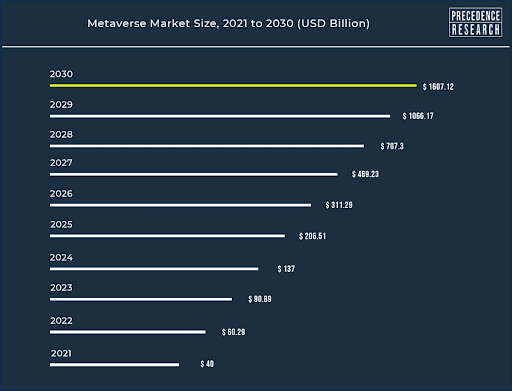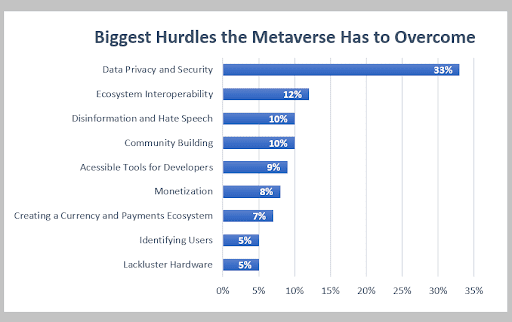
As technology gears up for one of its most significant periods of growth in the digital age towards a future built on the foundation of the metaverse, the sheer volume of data that businesses can turn to optimize both their internal and external operations will be unprecedented. Whilst this new frontier will be exciting for those who choose to embrace it, the rise of big data in the age of Web3 will serve as a major talking point in privacy matters.
The Growth of The Metaverse
The metaverse promises to utilize emerging technologies like virtual, augmented, and mixed reality in a way that will make our digital lives far more immersive and interconnected. Should the fanfare of Meta founder and CEO Mark Zuckerberg be believed, could we soon be capable of working, shopping, playing, and interacting within the near-limitless boundaries of the metaverse?
Already, a flurry of brands, including Adidas and Balenciaga, have raced to embrace the fledgling technology. Many more are exploring some blockchain solutions closely linked to the metaverse – like NFTs and crypto assets.
This new digital landscape can potentially change how businesses operate and individuals utilize technology fundamentally. It’s set to offer clients new advancements, promote more efficient collaboration worldwide, and generate new income potential for businesses.

Whilst the metaverse is an emerging market and subject to altering estimates regularly, data compiled by Precedence Research suggests that the market could top $1 trillion by the end of the decade as businesses move to adopt the technology.
“The investment interest in Metaverse and Web3 solutions from corporate entities and private offices and funds from all over the world has been increasing exponentially over the last months. It shows that Metaverse has become extremely valuable,” said Piers Dunhill, founder of Dunhill Ventures. “It opens up many possibilities for the venture capital flow, giving a chance for Metaverse to become a reality.”
At the heart of the metaverse will be unprecedented masses of data. Whilst the new frontier will be built on a distributed ledger like blockchain, the ability to ensure that the data captured in one metaverse will be reflected in the user experience model of another. This paves the way for plenty of cause for optimism and concern surrounding how this new virtual world will cater to businesses and users alike.
The Next Generation of Business Intelligence

As the metaverse becomes more widely used, businesses will have the ability to use cloud data to collect, analyze, and make decisions based on big data from both in-house and third-party sources.
With the right tools, these volumes of data can be structured, semi-structured, or completely unstructured, with algorithms on-hand to analyze and build predictive models based on the available information.
Businesses are still learning how these vast volumes of data can be used to optimize virtual and augmented channels within the metaverse. More intricate algorithms are expected to enter the fray in the coming years as the new landscape is still developing.
Data from BI-Survey suggests that 57% of companies use analytics to analyze large volumes of data, while 51% use it to build more robust predictive models. 50% use analytics to discover insights from various data sources, whilst 31% incorporate it to accelerate decision-making.
Life in the age of the metaverse is likely to be more fluid, with data entry points like keyboards replaced by virtual interactions from avatars. This means we’re likely to see more business-level dependence on analysis through predictive models and decision-making activities.
The prevalence of big data will also extend across more industries through the metaverse. In trade, for instance, we’re likely to see more brands and online stores turn to generate an online presence in dedicated digital marketplaces where customer avatars can walk into their shops by making their way through a virtual high street. Through these data insights, we will see more businesses turn to dedicated metaverse development studios like BORN to undergo more nuanced product development to create a virtual offering that users can engage with on an unprecedented scale.
The Necessity of Privacy
In an article exploring the sweeping changes the metaverse is set to bring to businesses and individuals alike, TIME magazine author Matthew Ball warns that: “As the world’s largest corporations and most ambitious start-ups pursue the metaverse, it’s essential that we—users, developers, consumers, and voters—understand we still have agency over our future and the ability to reset the status quo, but only if we act now.”
Ball’s warning comes alongside the prediction that the metaverse will intensify many of the world’s problems with digital existence today. Problems revolving around data rights, security, misinformation, radicalization, platform power, and user happiness will grow if left unregulated.

Indeed, data privacy and security have been highlighted as the biggest hurdle that the metaverse will need to navigate as the new frontier develops, according to data published by Agora.
Given Mark Zuckerberg’s enthusiasm for the metaverse, and Meta’s sketchy history with data privacy, concerns surrounding user data in a world where everybody’s interconnected on an unprecedented scale are certainly valid.
However, the decline of Facebook’s user base among young people may be a cautionary tale for corporations harboring underhanded intentions regarding how they plan to use data.
The sheer volume of big data that businesses will be able to gather in the age of the metaverse will be vast, but it’s only likely to be sustainable if collected transparently.
